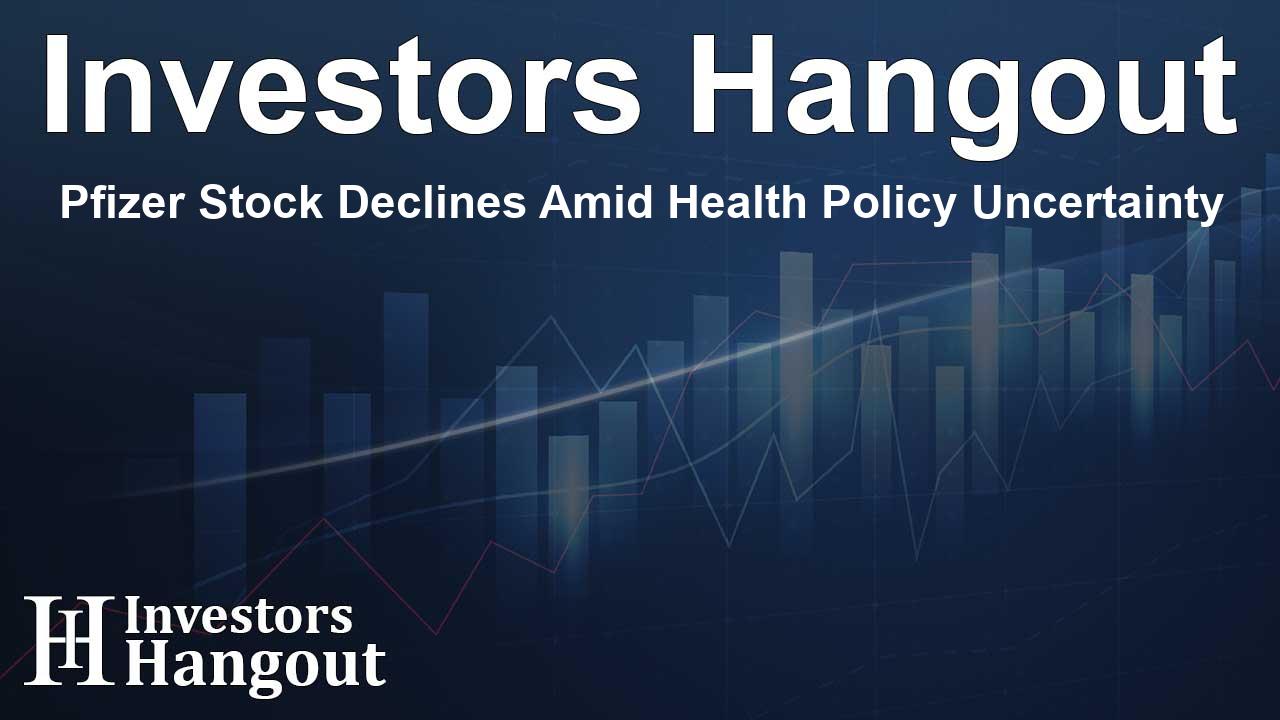Pfizer Stock Declines Amid Health Policy Uncertainty

Pfizer's Stock Performance in November
Pfizer Inc (NYSE: PFE) has seen a significant decline in its stock price, dropping by 10% to around $25.13 this November. This decrease brings the company's shares close to decade-lows, raising eyebrows among investors and analysts alike.
Impact of Kennedy's Nomination
The decline follows the announcement that Robert F. Kennedy Jr., known for his controversial views on vaccines, was nominated to lead the U.S. Department of Health and Human Services (HHS) by the President-elect. The nomination has sparked concerns about potential changes in vaccine regulation and oversight of pharmaceutical practices, which are vital to Pfizer's operations.
Concerns Over Vaccine Regulation
Kennedy’s history as a vaccine skeptic and his promotion of discredited theories relating vaccines to autism have intensified worries regarding the future landscape of U.S. health policies. With Kennedy at the helm, policy shifts could directly impact vaccine recommendations and FDA regulations—areas where Pfizer has established itself as a key player.
Potential Challenges for Pfizer
As a leading name in vaccine development, Pfizer is particularly vulnerable to changes in public trust and health policies. The company's success has heavily relied on its innovative products, including the well-known Prevnar pneumonia vaccine and the COVID-19 vaccine, which played a crucial role in combating the pandemic. Alterations to vaccine policies could place new hurdles in front of Pfizer's growth and market strategy.
Broader Implications for Pfizer's Operations
The implications of the nomination extend beyond vaccines. Pfizer's diverse pharmaceutical portfolio, which includes oncology, rare diseases, and cardiovascular drugs, may also encounter obstacles due to potential reforms in FDA approval processes and price regulations. Speculation abounds about how Kennedy's stance on pharmaceutical practices might influence the industry's trajectory.
Market Reactions and Analyst Predictions
As discussions around Kennedy's role continue, analysts are cautioning that notable shifts in vaccine policies could alter the dynamics within the pharmaceutical sector. These changes could lead to increased volatility in stock prices, with Pfizer being one of the most affected companies due to its stake in vaccine production.
How to Invest in Pfizer Stock
If you're interested in investing in Pfizer, there are a few essential steps to consider. Purchasing shares is generally straightforward through a brokerage account. Many platforms offer the ability to buy fractional shares, allowing broader access to investors who may not want to or cannot afford full shares of high-priced stocks.
Options for Short Selling
For those looking to bet against PFE's stock, the process varies significantly. Accessing an options trading platform is necessary for short selling. Investors can profit from declines in stock prices by either borrowing shares to sell or utilizing options strategies such as buying put options or selling call options at higher strike prices than the current stock price.
Current Trends and Stock Performance
Recent data indicates that PFE’s stock reached a 52-week high of $31.54 and a low of $24.48. Keeping an eye on market trends, especially how policy decisions relate to public perception of vaccines, will be crucial for current and prospective investors.
Frequently Asked Questions
What caused the decline in Pfizer's stock price?
The decline is largely attributed to concerns surrounding the nomination of Robert F. Kennedy Jr. to lead the HHS, which raises questions about potential changes in health policy impacting vaccine regulations.
How has Kennedy's nomination affected Pfizer?
Kennedy's nomination has intensified concerns over vaccine policy shifts, which could impact public trust and, consequently, Pfizer's vaccine-related sales and production strategies.
How can I invest in Pfizer's stock?
You can invest in Pfizer by purchasing shares through a brokerage account. Some platforms allow for fractional shares, which can be helpful for individual investors.
What are the risks associated with investing in Pfizer now?
Investing in Pfizer now involves risks such as potential volatility driven by policy shifts and public sentiment regarding vaccination, especially with Kennedy's views potentially influencing policy decisions.
What is Pfizer's current stock performance?
Pfizer's stock has shown volatility, with a recent trading price around $25.13, reflecting investor concern over future health policy impacts.
About Investors Hangout
Investors Hangout is a leading online stock forum for financial discussion and learning, offering a wide range of free tools and resources. It draws in traders of all levels, who exchange market knowledge, investigate trading tactics, and keep an eye on industry developments in real time. Featuring financial articles, stock message boards, quotes, charts, company profiles, and live news updates. Through cooperative learning and a wealth of informational resources, it helps users from novices creating their first portfolios to experts honing their techniques. Join Investors Hangout today: https://investorshangout.com/
Disclaimer: The content of this article is solely for general informational purposes only; it does not represent legal, financial, or investment advice. Investors Hangout does not offer financial advice; the author is not a licensed financial advisor. Consult a qualified advisor before making any financial or investment decisions based on this article. The author's interpretation of publicly available data shapes the opinions presented here; as a result, they should not be taken as advice to purchase, sell, or hold any securities mentioned or any other investments. The author does not guarantee the accuracy, completeness, or timeliness of any material, providing it "as is." Information and market conditions may change; past performance is not indicative of future outcomes. If any of the material offered here is inaccurate, please contact us for corrections.